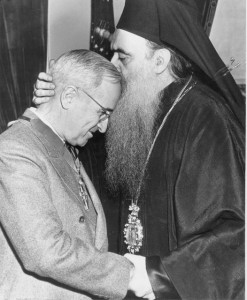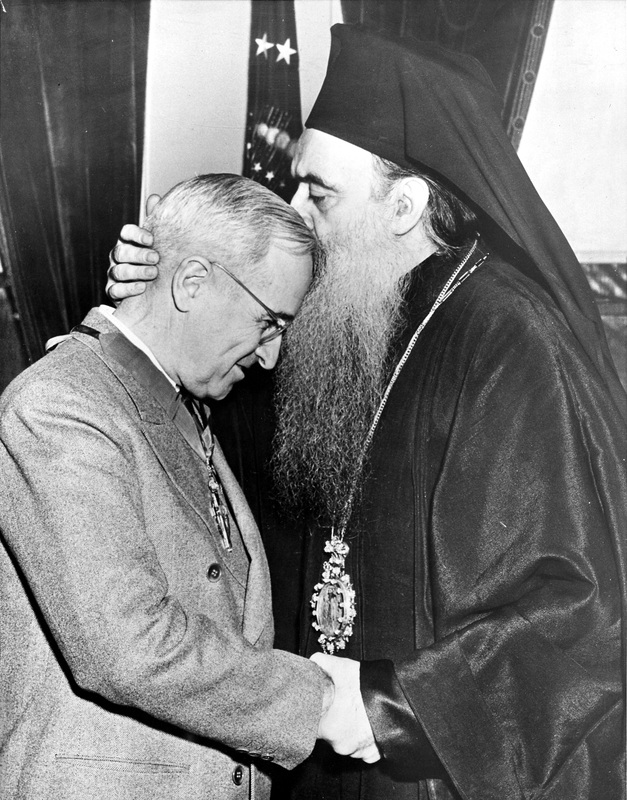
Last fall, I spoke at a conference at Hellenic College-Holy Cross, commemorating the centennial of the Greek Orthodox Archdiocese of America. I’ve already posted my main paper from that conference, on the “barbarian lands” theory of the Ecumenical Patriarchate. At that conference, I also spoke briefly about Ecumenical Patriarch Athenagoras, who, prior to becoming Patriarch, was the Greek Archbishop of North and South America. The text of that talk is below.
It’s impossible to do justice to a giant like Athenagoras in ten minutes – he deserves a whole conference. In the time I have, I’m going to focus on one particularly distinctive aspect of his tenure in America: his relationship with the United States government and his ideal of “America.”
One of the most important things you can understand about Athenagoras is that he absolutely loved America – the mythos of America, what, in his view, America stood for. He believed in a divinely-appointed, almost messianic destiny for the United States. In 1951, when he was Ecumenical Patriarch, he had a meeting with the U.S. Consul in Istanbul. Here’s how the Consul described what Athenagoras said: “As usual, he talked at some length of his belief that the United States must remain in the Near East for several centuries to fulfill the mission which had been given it by God to give freedom, prosperity and happiness to all people.”
In March 1942, then-Archbishop Athenagoras met with an agent of the OSS (which was the precursor to the CIA). Athenagoras told the agent, “I have three Bishops, three hundred priests and a large and far flung organization. Every one under my order is under yours. You may command them for any service you require. There will be no questions asked and your directions will be executed faithfully.” He was deeply concerned that the Allies should be victorious.
A month later, Archbishop Athenagoras – who was 56 years old – attempted to enlist in the U.S. Army. He was turned down, but he continued to work closely with the OSS. One of his tasks was to identify eligible Greek-Americans to serve in the military. Under orders from Athenagoras, the bishops and priests of the Greek Archdiocese collected something like a hundred thousand names in short order, which astonished the OSS. This caught the attention of William Donovan, the head of the OSS, who began direct communications with the Archbishop. In May 1942, Athenagoras wrote to Donovan, “I think I don’t do very much for the U.S., to whom I am deeply indebted. I am ready though to submit myself to any duty and to make every possible sacrifice for our beloved Country, which is fighting for Universal freedom and justice and for the New Day which is to come.”
In 1943, Athenagoras announced plans for an English-speaking seminary. The primary motivation behind this seminary was more political than pastoral, and it was aimed at training priests to serve in Europe, not the United States. Here’s how Athenagoras himself described the plan: “When priests trained at the seminary return to their countries they will help further good will and understanding between the Church in America and the Orthodox Church in Europe. Generally speaking, Americans interested in post-war problems do not realize that the Orthodox Churches in Russia, Greece, Syria, and other countries will have a great influence in rehabilitation efforts after the war. Our purpose is not only to train future priests in democratic precepts, but to convince them that real democracy consists of much more than mere lip service.”
In the end, the seminary idea never came to fruition, but it shows Athenagoras’s creative approach to leveraging his role as Archbishop for the benefit of American political ideals.

As World War II gave way to the Cold War, the Ecumenical Throne changed hands – the elderly Patriarch Benjamin died, and his right-hand man, Maximos of Chalcedon, was elected Patriarch. Maximos was viewed by many as the wrong man at the wrong time – he was seen as too weak in the face of an ascendant Soviet-backed Moscow Patriarchate, and it was widely reported that he was mentally unstable. Meanwhile, Archbishop Athenagoras’s bond with America grew ever closer. On January 28, 1947, Athenagoras had a private, off-the-record meeting with President Harry Truman and a few key Greek officials. Three weeks later, Athenagoras gave Truman a piece of the True Cross, which led to a famous photo of Athenagoras kissing Truman’s head.
A month after that, Truman addressed Congress and formally articulated, for the first time, what has become known as the Truman Doctrine: “the policy of the United States to support free peoples who are resisting attempted subjugation by armed minorities or by outside pressures.” That’s a fairly well-known fact, but what’s often forgotten is that the immediate cause of Truman’s speech was the news that the British would stop providing aid to the Greek government, which was embroiled in a civil war against the Greek Communist Party. The British had also been aiding Turkey, and in his speech, Truman also asked Congress to provide aid to the Turks. Altogether, Truman asked Congress to approve $400 million in aid to the Greek and Turkish governments, and to authorize sending US military personnel and equipment to the region. The Truman Doctrine was originally conceived in the context of Greece and Turkey.
Then in May, fresh off the announcement of the Truman Doctrine, the New York Times reported that Patriarch Maximos was having an “acute nervous breakdown,” and Archbishop Athenagoras was named as the leading candidate to succeed him. The interest of US intelligence officials in the matter did not go unnoticed by the Times, which wrote: “No official support of Archbishop Athenagoras has been expressed by the Americans although United States military intelligence is watching the race.” The Times added, “The Turks call the Archbishop Turkey’s unofficial ambassador to the United States, so cordial are his relations with the Turkish Government… The Greek Government is favorable to Archbishop Athenagoras but is reluctant to have such an efficient emissary leave the United States and its wealthy contributors to Greek causes.”
Athenagoras, then, was the perfect solution to the Patriarchal problem: he was favored by the United States, Turkey, and Greece. Patriarch Maximos finally resigned in October 1948, after an extremely difficult 32-month tenure as Patriarch. General George Marshall, the U.S. Secretary of State, personally lobbied for Athenagoras to become the next Ecumenical Patriarch. The powerful Greek-American businessman Spyros Skouras, whom Marshall consulted during this process, wrote, “General Marshall, in his capacity as Secretary of State, had no hesitation in sponsoring His Holiness and thanks mainly to his efforts and influence, the Holy Synod decided to elect Archbishop Athenagoras as Patriarch and the Turkish Government agreed to his election.”
After his election, but before leaving the United States, Athenagoras met with President Truman. It’s perhaps at this meeting that Truman offered to let Athenagoras fly to Istanbul on an airplane provided by the U.S. government. It’s been widely reported that this was actually the Presidential plane, which had the awkward name “The Sacred Cow.” Other reports are that the plane was just a U.S. military plane, not the Presidential one. Either way, the message was clear: Athenagoras and America were aligned.
This strategic alliance was forged during Athenagoras’s years as Archbishop of North and South America. But for Athenagoras, at least, the relationship was far more than strategic. His love for America was deep, even passionate. In 1953, the U.S. Consul in Istanbul wrote of a visit with Athenagoras, “the Patriarch spent much of his time in expressing his love and admiration for the United States and all things our country represents. He went so far as to state that the cornerstone of the policy which he had set for himself as Patriarch was to advance American ideals. His expressions of admiration for the United States were at times so unrestrained as to become almost embarrassing.”
To read much more about Athenagoras and his relationship with the CIA and the State Department, as well as his love for America in general, see these articles:
Greek Archbishop to proto-CIA: “Your directions will be executed faithfully.”
Plans for an English-speaking seminary & an Orthodox census in 1943
There’s a Piece of the True Cross at the Truman Library in Missouri
Athenagoras: The Apostle of America to Orthodoxy

Leave a Reply